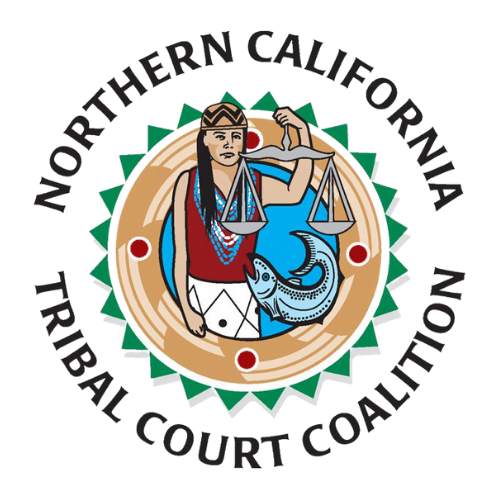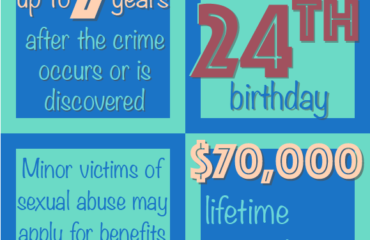April 19 – 25, 2020 is National Crime Victims’ Rights Week
Why victim rights are important for Native people
Over 80 percent of American Indian and Alaska Native women and men have experienced violence in their lifetime, according to a 2016 study by the National Institute of Justice. 97 percent of women and 90 percent of men reported that at least one incident of violence was committed by a non-native person.
Native people frequently experience intergenerational trauma due to colonial violence and historical injustices. When a perpetrator commits a violent crime against a native person, retraumatization can occur. This is often manifested as feelings of helplessness, vulnerability, anxiety, and chronic stress. Diseases that can be triggered or aggravated include cardiovascular disease, arthritis, diabetes, respiratory and digestive disorders, chronic pain, insomnia, and loss of reproductive function. Enforceable victim rights are especially important for American Indians and Alaska Natives to reduce the likelihood that the investigation and prosecution of perpetrators will inflict additional on native victims. Unlike the dehumanizing experiences of historical wrongs, California Victims’ Bill of Rights can protect the dignity, safety, confidentiality, and property of victims, including native people, who experience violence.
A summary of the California Victims’ Bill of Rights
The Victims’ Bill of Rights are part of the California Constitution, Article I, Section 28(b). Also known as Marsy’s Law, it contains a list of 17 specific rights that are intended to protect victims through all phases of the legal process. We have categorized these rights into nine categories as follows:
Human rights and personal dignity
This section provides both positive and negative rights. Positive rights identify the treatment to which you are entitled: fairness, respect for your privacy, and dignity. Negative rights entitle you to be free from certain treatment: intimidation, harassment, and abuse. Section 28(b)(1).
Safety
Three provisions address safety of the victim and the victim’s family. You are entitled to be reasonably protected from the defendant and others who are acting on the defendant’s behalf. You are entitled to have the court consider your safety and the safety of your family and community when it sets bail, release conditions, parole, or makes post-judgment release decisions. Section 28(b) has (2), (3), (16).
Confidentiality
You are entitled to prevent the disclosure of certain information to defendant, the defendant’s attorney, or anyone else who is acting on the defendant’s behalf. The information you are entitled to protect includes confidential information that could be used to locate or harass you or your family. You are also entitled to protect any confidential information you communicated when you received medical treatment, counseling treatment, or engaged in privileged communication that is protected by law. Section 28(b)(4).
Consent
You are entitled to refuse an interview, deposition, or legal discovery request from the defendant, the defendant’s attorney, or anyone else who is acting on the defendant’s behalf. If you consent to an interview you are entitled to set reasonable conditions for conducting the interview. Section 28(b)(4).
Receive and request information
You are entitled to be reasonably notified about the defendant’s arrest, the charges filed, and extradition determinations. You are also entitled to request reasonable notice about all public proceedings at which the prosecutor and defendant are entitled to be present, and about all parole or other post-conviction release proceedings. You are also entitled to be present at these proceedings.
You are entitled to request that you are informed about any disposition of the case before trial, and may request to reasonably confer with the agency that is prosecuting the case. You are also entitled to request the pre-sentence report when it is available to the defendant (some portions may be redacted due to confidentiality).
You are entitled to make reasonable requests to be informed of the conviction, sentence, place and time of incarceration, or other disposition of the defendant, the scheduled release date of the defendant, and the release of or the escape by the defendant from custody.
If the offender becomes eligible for parole, you are entitled to be informed of all parole procedures and you are entitled to request notification when the offender is paroled or released.
Also, you are entitled to be informed of your Marsy’s Law rights.
Section 28(b)(6), (7), (11), (12), (17).
To be heard, to speak, and to provide input
You are entitled to request to be heard at any proceeding that involves a post-arrest release decision, plea, sentencing, post-conviction release decision, or any proceeding in which a right of the victim is at issue.
When a probation department official is conducting a pre-sentence investigation you are entitled to provide information about the impact of the offense on the you and your family. You are also entitled to make sentencing recommendations before the defendant is sentenced.
You are entitled to participate in the parole process and provide information that you wish the parole authority to consider before the offender is paroled or released. Section 28(b)(8), (10), (15).
Due process and closure
Under the U.S. Constitution, criminal defendants are entitled to a speedy trial. The California Constitution recognizes that victims are also entitled to a speedy trial. Additionally, victims are entitled to a prompt and final conclusion of both the case and any post-judgment proceedings. Section 28(b)(9).
Restitution
You are entitled to restitution when you have been a suffered a loss as a result of the crime. Restitution is ordered in every case in which a crime victim suffers a loss. When the court collects monetary payments, monies, and property from a person who has been ordered to pay you restitution, your restitution payment has first priority. Section 28(b)(13)(A), (B), (C).
Personal property
When you have provided evidence to law enforcement to help with its investigation, you have the right to have your property returned promptly when it is no longer needed. Section 28(b)(14).
How to enforce your rights
If your victim rights are violated you are entitled to ask a trial or appellate court to enforce your rights. You can file a request with the court yourself, or you can ask an attorney, your lawful representative, or the prosecuting attorney in the case to ask the court to enforce your rights. Section 28(c)(1).
You can read the full text of Article I, Section 28 here.
Northern California Tribal Court Coalition has resources to help
A trauma-informed approach to victim services can help tribal victims victims recover from violence. Northern California Tribal Court Coalition’s free mobile App provides on the go access to victim resources. You can read the full text of the California Victims’ Bill of Rights, view short videos that provide more details, and learn how to assert your rights. Often the legal process can seem like a confusing maze. Knowing your rights and having access to experienced advocates and attorneys can reduce the stress of navigating the legal process.
We are here to help. If you would like assistance with downloading or using the NCTCC App, please contact one of our Program Specialists to obtain technical assistance or arrange a one-on-one or group training session: Cynthia Boshell at cboshell@nctcc.org or Jake Swamp at jswamp@nctcc.org.
Links to sources for this article
About Marsy’s Law. (n.d.). Retrieved April 21, 2020, from https://www.marsyslaw.us/about_marsys_law


